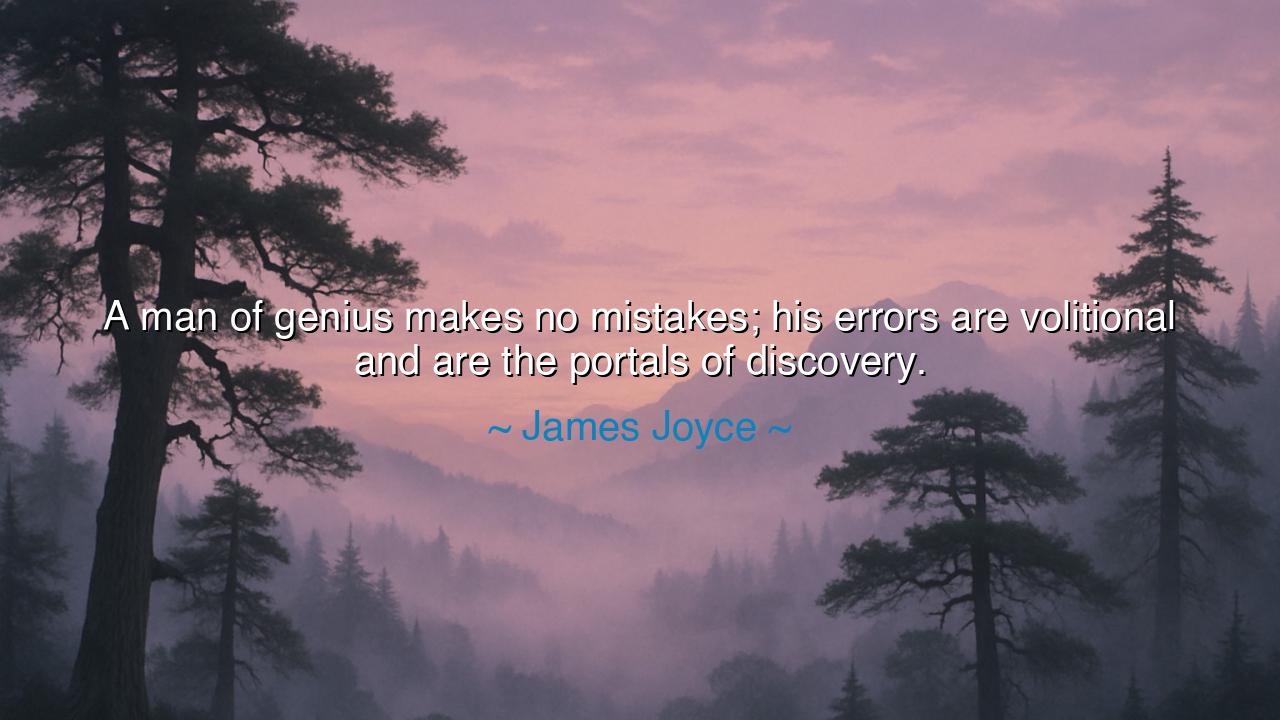
A man of genius makes no mistakes; his errors are volitional and
A man of genius makes no mistakes; his errors are volitional and are the portals of discovery.






“A man of genius makes no mistakes; his errors are volitional and are the portals of discovery.” — Thus declared James Joyce, the poet of consciousness and the sculptor of language, whose works reshaped the very foundations of modern literature. In this sentence, radiant with paradox, Joyce reveals a secret of creation known to all true artists and seekers of wisdom: that what the world calls error is, in truth, the beginning of discovery. The genius does not stumble blindly; even his missteps are guided by an inner necessity, a will that transforms failure into revelation.
For in the mind of the ordinary man, a mistake is something to be avoided, feared, or forgotten. But to the man of genius — the one whose soul burns with curiosity and vision — mistakes are not defeats, but pathways. They are not accidents, but volitional, meaning chosen, embraced, even welcomed as part of the journey. For genius, in Joyce’s teaching, is not the absence of error, but the ability to turn error into insight — to see in each flaw a hidden door, a portal of discovery leading to a truth that cannot be reached by perfection alone.
Joyce himself lived by this creed. In his great works, Ulysses and Finnegans Wake, he shattered the conventions of storytelling and language. Many thought his writing chaotic, filled with contradictions and seeming errors of grammar and form. Yet in those deliberate imperfections, he opened new dimensions of art and thought. His volitional errors — the bending of words, the breaking of syntax, the fusion of languages — became instruments of revelation. He showed that meaning could be born from disorder, that even confusion could be a form of higher clarity. Thus, what critics called madness was, in truth, method, and his mistakes became immortal portals through which literature entered a new age.
This principle echoes across the ages. Consider Christopher Columbus, who, believing he had found a new route to Asia, instead discovered the Americas. His error, though unintended, changed the course of history. Or think of Alexander Fleming, whose laboratory contamination led to the birth of penicillin — a mistake that saved millions of lives. These were men whose “errors” were, in Joyce’s sense, volitional — not because they planned them, but because they possessed the openness of genius: the ability to see beyond failure and recognize the new world hidden within the ruins of expectation.
Even in the ancient world, this truth was known. The philosopher Heraclitus taught that “the way upward and the way downward are one and the same.” From confusion arises order; from failure, wisdom. The wise do not fear error, for they know that creation itself is born from chaos. The artist, the inventor, the thinker — all must pass through the valley of uncertainty to reach the mountain of understanding. The mistake, then, is not the enemy of genius but its companion, its teacher, its sacred gate.
Yet Joyce’s words carry a deeper challenge still. He does not praise mistakes made in carelessness, but those made voluntarily — through daring, experimentation, and the courage to go beyond the known. The genius does not seek safety; he risks error for the sake of truth. He knows that no discovery was ever made by one who feared to fail. His errors are acts of will, steps into the dark guided by faith in the light beyond. For in creation, as in life, certainty is a prison, but curiosity is freedom.
The lesson, then, is this: do not shrink from your mistakes, but learn to see them as portals of discovery. When you err, pause not in shame, but in wonder. Ask what the mistake reveals — what new truth it brings into view. Cultivate the courage to act volitionally, to err with purpose, to seek the edge where failure becomes transformation. For every error, rightly understood, is a teacher, and every failure, properly faced, is a door opening toward wisdom.
So remember the teaching of James Joyce: “A man of genius makes no mistakes; his errors are volitional and are the portals of discovery.” Let your life, too, be filled with such sacred errors — not the careless mistakes of fear or haste, but the brave experiments of the soul in search of truth. For only through those portals will you find the path to greatness — and beyond every apparent failure, the light of discovery waiting to be born.






AAdministratorAdministrator
Welcome, honored guests. Please leave a comment, we will respond soon